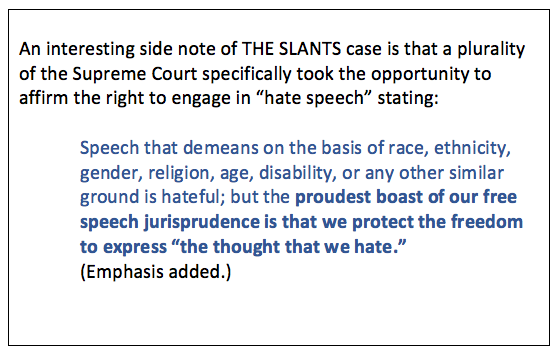It’s a Fine Line Between Hate and Love – U.S. Supreme Court on Trademarks
FIRST AMENDMENT PROTECTS DISPARAGING TRADEMARKS
A few years back a rock band tried to trademark its name — THE SLANTS. The U.S. Patent & Trademark Office (PTO) refused to register the trademark based on the statutory prohibition of “disparaging†trademarks found in 15 USC §1052(a).[1] The PTO reasoned that because “slants†can be used to disparage Asian people, it was a “disparaging†trademark and could not be registered with the PTO.
The band said they chose the name The Slants to reclaim the word. They wrote a song about their experience trying to register this trademark, and their feelings about the word.
The case made its way to the U.S. Supreme Court. The Supreme Court held that prohibiting registration of the trademark violated the First Amendment right to free speech. THE SLANTS is now a registered trademark.


The Supreme Court took a strong stand in favor of the First Amendment in The Slants case, affirming that the disparagement clause in §1052(a) violates the free speech rights found in the First Amendment. See, Matal v. Tam, 137 S.Ct 1744 (2017).

FIRST AMENDMENT PROTECTS DISPARAGING TRADEMARKS — DOES THE FIRST AMENDMENT PROTECT SCANDALOUS TRADEMARKS?
After The Slants case, the PTO refused to register the trademark FUCT for clothing and other items. Based on The Slants case, the Federal Circuit overturned the PTO decision, and approved the registration of a trademark FUCT. This word was not analyzed as being “disparagingâ€, it was analyzed as being “scandalous†implicating a different clause of the same code section.[1]
The Federal Circuit noted that the the concept of what is scandalous changes over time. Previously considered scandalous:
- MADONNA for wine (now permitted and registered as a trademark in 2008 without even referencing the fact that this was previously considered “scandalousâ€)
- BLACK TAIL for adult entertainment magazines (refusal to register affirmed by Federal Circuit in 1994, now the same applicant has a registered trademark for BLACK TAIL for adult entertainment services)
The Federal Circuit looked to The Slants case, and held that refusing to register FUCT was an unconstitutional content-based restriction on speech. In other words, refusal to register FUCT violated the First Amendment. This appears to be in alignment with the Supreme Court’s decision in The Slants case. To many of us it follows that if the First Amendment protects hate speech, it should also protect scandalous speech.
But for some reason, the Supreme Court felt the need to review the Federal Circuit’s decision, and in January 2019, the Supreme Court granted review of the decision to approve the trademark registration. The Supreme Court is expected to hand down its decision in the FUCT case in June.
TRADEMARK REGISTRATION CAN BE COMPLICATED
Trademarks are a valuable tool for protecting brands and businesses. But, trademark applications may involve tricky issues such as the correct applicant/owner, or what is the best classification or description of goods/services.
Contact Adams Law Office if you have questions about protecting your trademarks.
[1] 15 U.S.C. §1052: No trademark by which the goods of the applicant may be distinguished from the goods of others shall be refused registration on the principal register on account of its nature unless it— (a) Consists of or comprises immoral, deceptive, or scandalous matter; or matter which may disparage or falsely suggest a connection with persons, living or dead … (Emphasis added.)
This blog is made available by Adams Law Office for educational purposes only to convey general information and a general understanding of the law, and not to provide specific legal advice. By using this blog you acknowledge there is no attorney-client relationship between you and Adams Law Office. This blog should not be used as a substitute for competent legal advice from a licensed professional attorney applied to your circumstances.
